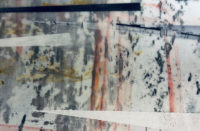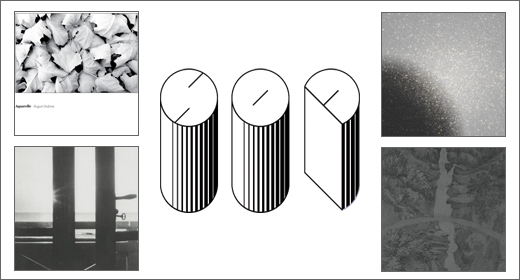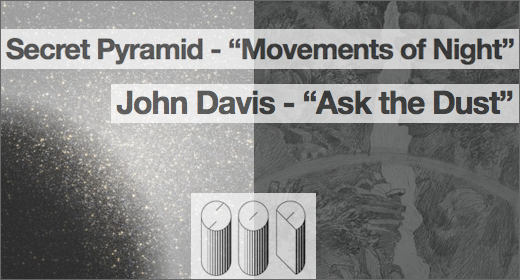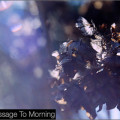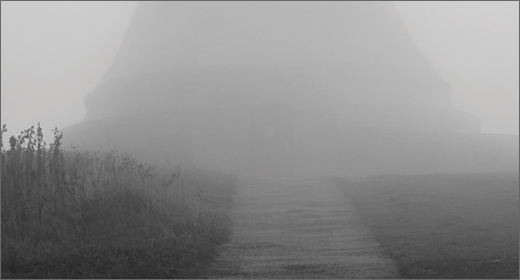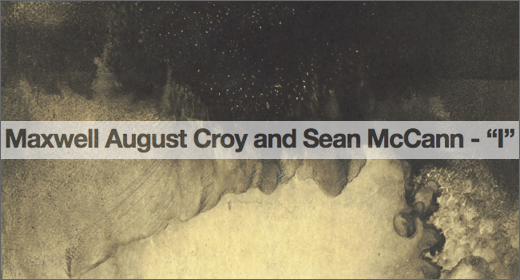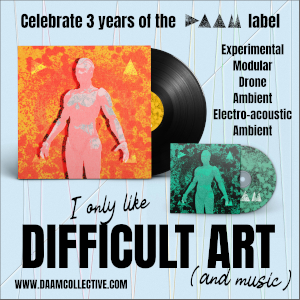 The last year has seen Experimedia move up into the big league, a series of compelling recordings by the likes of Lawrence English and Black Swan putting it up among the year’s best (here and here). Jeremy Bible not only ramped up his Ohio enterprise’s release schedule but also situated it as prime purveyor and himself as chief curator of all things electronically bright and experimentally beautiful via his store and soundcloud site. Lately there’s been no relenting, but a redoubling, with Experimedia taking on Alex Cobb’s Students of Decay in a partnership, supporting it directly through pressing, distribution, and label management. There follows a multi-review of three Experimedia works—by From The Mouth of The Sun, Celer, and Damian Valles, and five Students of Decay submissions—from En, Bryter Layter, Marielle V Jakobsons, Ossining, and Cobb himself.
The last year has seen Experimedia move up into the big league, a series of compelling recordings by the likes of Lawrence English and Black Swan putting it up among the year’s best (here and here). Jeremy Bible not only ramped up his Ohio enterprise’s release schedule but also situated it as prime purveyor and himself as chief curator of all things electronically bright and experimentally beautiful via his store and soundcloud site. Lately there’s been no relenting, but a redoubling, with Experimedia taking on Alex Cobb’s Students of Decay in a partnership, supporting it directly through pressing, distribution, and label management. There follows a multi-review of three Experimedia works—by From The Mouth of The Sun, Celer, and Damian Valles, and five Students of Decay submissions—from En, Bryter Layter, Marielle V Jakobsons, Ossining, and Cobb himself.
::..:::…..:..::….:::::..:::..:::::::……:::…::.:::….::::..:..:::…::…….:::::
[soundcloud url=”http://api.soundcloud.com/tracks/33196008″ width=”100%” height=”166″ params=”auto_play=false&show_artwork=true&color=000000″ iframe=”true” /]
[Release info] First up, Woven Tide on which Gothenberg’s Dag Rosenqvist with Kansas-based Aaron Martin commune as From The Mouth of The Sun. Rosenqvist has for some time trafficked in a lowlight blend of postclassical-inflected ambient drone under the cloak of Jasper TX for the likes of Miasmah, Low Point, Under The Spire, Dead Pilot, and Rural Colors. Martin, no slouch he, has previous form on Experimedia, also on Preservation, Type, Mobeer, Under The Spire, and Sonic Meditations. The keynote for the collaboration, carrying the same sombre freight as its contribution to “Weight of Days,” standout track from Jasper TX’s The Black Sun Transmission is Martin’s cello. It acts as a shivery-timbred foil to Rosenqvist’s guitar/drone base, drawing out a doleful languor of bows and plucks over a patina of incubus and susurrus and detritus presumably left by his sidekick. Together they play out a rhapsody in grey, forged with textured scuzz as well as the respectable tools of tune-smithery. It’s a well turned out, if somewhat donwcast, affair of elegiac – ambience with traces of post-rock pluckery and b(e)ardy folk-isms. “Color Loss” reflects its title semiotically in a slow electronic depletion, leaving a sense of desolation, compounded with an incursion of strings, while “Like Shadows in an Empty Cathedral,” with its pregnant pauses and brass-like sonorities, has about it an air of the Johann Johannsson. The album lurks in the shadows of the mood-music spectrum, cello and piano leading a series of minor-key moves on soft heart-string tug targets. Yet it sometime manages to find, mimetically modelling a straining beyond, behind the wall of drear, intimations of states other than the standard sad signifieds. A refinement of decline, if you will, in slides and glides in blue, dips and tipping points, low flow to crescendo. Some sources are blurred beyond, others have properties comfily preserved – string scrape, vinyl hiss, radio crackle, so when “A Season in Waters” lets e-bow string buzz sneak out through an ambient scrim it’s a sort of arm around you. Overall Woven Tide emerges, crepuscular, with a glowing quietude, dusty piano chords, gravid strings, assorted fizz-fuzz, a slow-mo ebb-flow—ponderous, pondering—the enduring leitmotif. Sometimes a sort of uplift, mostly a sense of brooding contemplation, making for a fine film foil–as in this clip from Remember Me, My Ghost.
::..:::…..:..::….:::::..:::..:::::::……:::…::.:::….::::..:..:::…::…….:::::
[soundcloud url=”http://api.soundcloud.com/tracks/35889486″ width=”100%” height=”166″ params=”auto_play=false&show_artwork=true&color=000000″ iframe=”true” /]
[Release info] Evaporate and Wonder is the latest ripple in a steady Celer stream whose flow continues with the same reassuring regularity notwithstanding Dani’s departure several years ago. Will Long soldiers on manfully, wil(l)fully, if you will, maintaining their signature glacial-warm form of electronically-enhanced holy minimalism. It’s in particularly good voice here, and substantially less reticent than on certain more parsimonious recent works (cf. Dying Star). Though source material for the recordings is similarly limited—to improvised synthesizers and field recordings in this case, end results are gratifyingly less mean, more moody and magnificent, uncompromised by eponymous evaporative habit—indeed, wonders of diaphanous expansivity. The first of two long-form pieces, “Bedded in Shallow Blades,” is a glassine flow of radical etherealism within which low-end seep creeps through under a nebula of serpentine sonorities simultaneously solid, liquid and gas. A sound so close yet far away, as if a capture of echoes of something that once was straining towards release—towards an elusive eternal perhaps. This orientation is further evidenced on “Repertoire of Dinless Shifts,” on which silvery shoals of minnow-y timbres are maneuvered through a nocturnal hum of sublimated thrum. What ensues is a minimally orchestrated sequence of long drawn out languorous exhales of harmonically coloured haze, eschewing earth and fire for aether and air. Solicitous interventions in processing and composition issue in a fabric of a certain density that nevertheless retains an openness of texture, a supple body and lightness of cadence. Evaporate and Wonder is among the last works Celer recorded as a duo, and here their forces converge with particularly delicate precision in a numinous diptych washed in shades luminous and opaque, static yet shifting, barely there yet fully present, at once everywhere and nowhere.
::..:::…..:..::….:::::..:::..:::::::……:::…::.:::….::::..:..:::…::…….:::::
[soundcloud url=”http://api.soundcloud.com/tracks/46826690″ width=”100%” height=”166″ params=”auto_play=false&show_artwork=true&color=000000″ iframe=”true” /]
[Release info] Damian Valles’s Nonparallel (In Four Movements) comes on the back of a prolific 2011: two full lengths (Fixtures, Skeleton Taxa), two EPs (The Waves That Destroy, Old Tin Will Cry), five compilation appearances (Hidden Landscapes, Just A Moment, Kanshin, Sequence 1, Sequence 2), a couple of collabs (The Clyde Parker Project Session 4 and A Silent Swaying Breath), not to mention a short documentary soundtrack (Three Walls). This, though, is something else again—not just in source choice, though these are singular enough, culled as they are from 60s/70s Nonesuch recordings of avant-garde Western classical composers and computer music, but also in terms of result. Fragments from Carter, Bolcom, Ives, Wuorinen, and Wolpe were captured and cut up, processed and pressed into compositional service. Though characterized elsewhere as an ‘oddity’ in being ‘an experimental drone record made from snippets of experimental drone records’, it’s not that odd when one considers a tradition including turntablists (cf. Philip Jeck) and recyclists (cf. Asmus Tietchens). It is, however, noteworthy in other ways. It’s one thing to seek to situate one’s work in the material’s exploratory lineage—one of serialists and set theorists and other -ists; it’s another to forge an eloquent dialogue with it, taking something of its essence while adding to its legacy decades on through considered recontextualization. Old vinyl brings with it a fizzing freight, a crackle-pop ground-field for emergent figures, shades of The Caretaker and the like in its stretching of tired sounds into fresh articulation—effecting a symbiotic transfer to the overall sound. Subject matter is choreographed into intense drone-slabs of static churn, haunted by the ghosts of pioneers audible but occluded within the black folds of its four treacly movements. “Movement III” is the most inclined toward consonance of what is a largely atonal set, but it offers scant comfort, for even as it glows it glowers with suppressed Hecker-esque portent. In a sense Nonparallel is as much archaeology and cultural anthropology as it is new musical expression, with Valles documenting both provenance and valency of his material in abstraction and bricolage.
::..:::…..:..::….:::::..:::..:::::::……:::…::.:::….::::..:..:::…::…….:::::
[soundcloud url=”http://api.soundcloud.com/tracks/41457972″ width=”100%” height=”166″ params=”auto_play=false&show_artwork=true&color=000000″ iframe=”true” /]
[Release info] Next SF dream-droners, En, follow up accomplished debut with Already Gone. It finds Maxwell August Croy and James Devane opening up their tonal palette, mining even richer sonic veins, revealing rather more of their source material hidden by a previous more acousmatic habit, a paradigm shift that gives full voice to the differing resonances of En’s instrumentation. Their sun-struck vignettes achieve new heights of psychoactive transport, notably the glistening “The Sea Saw Swell,” a submersive piece that builds from Croy’s koto, expanding, pinging across the soundfield to meet Devane’s looping guitar swells as they emerge from a shifting drone haze. Before this, “Lodi” has set out their stall, all fluttering guitar-sprung sparkle in a crystalline ooze, nicely tethered by a fulcrum of bass prods, around which circle spare effervescent themes and airy fizzing counterpoint. “Marble Steppe” and the title track are in a similar cosmic drone-scaping vein: a gentle enveloping of float-drift soft-grain textures, with remote scrapes of percussion and bowed strings, enticingly unadorned instrumental limbs peeking through the blur. The restraint of their treatments preserves the timbral nature of source, shadings, be it koto, guitar or melodica, nestling beside processed washes—typically a backdrop of layers of soft organ-esque swells, held but shifting. Drones are a part of their armoury, but this is no lone Drone zone. What clinches it is an ear for something beyond the drone—melody! Take epic slow-burner, “Elysia,” a 20-minute chef d’oeuvre that sees them set the controls for the heart of the sun, and soar till wings are melted in a heat surge sending them plummeting back to earth. It’s celestial, cosmic, cacophonic, yet somehow singable in the bath—albeit in several movements: captured nature-tones and tape-saturation deployed to douse chant-like motifs on bowed strings and a rippling koto chorale, spiralling, then chased over a looming heaving layer of grainy tonemass with compelling affect; a crescendo of sorts, then the wave subsides, returning to descending tintinnabulations, and a patter of raindrop-like tone particles. Overall, Already Gone is possessed of a lyrical liturgical sweep, all moonlit swells of midnight ocean and aether drift. Past references to Tim Hecker and Stars of the Lid may linger, but the juxtaposition of the familiar of organic instrumentation with an electronically otherized suspension allied to greater dynamic sensibility here sets En apart from copyists and the ambient drone post-classical herd.
::..:::…..:..::….:::::..:::..:::::::……:::…::.:::….::::..:..:::…::…….:::::
[soundcloud url=”http://api.soundcloud.com/tracks/23777629″ width=”100%” height=”166″ params=”auto_play=false&show_artwork=true&color=000000″ iframe=”true” /]
[Release info] Eponymity with a Nick Drake album may be intended as hommage, but the sound of Bryter Layter, at least as heard through Two Lenses, presents far from that artist’s strum’n’pluck and breathy wistful warble. Perhaps one might remotely sense an alignment of spirit—a certain ethereal poignancy, however differently sonically articulated. Behind the nomenclature is the duo of Arbor-master Mike Pollard (aka Pale Blue Sky and Treetops) and Joseph Raglani, of Arbor and Kranky reknown, communing to extract lyrical cosmic gold from base analogue synthetic metal. It shuns the long-form drone techniques de rigueur among the bulk of the current crop of post-Kosmische bandwagoners, preferring short, melodic vignettes to large format tableaux. Pollard’s Pale Blue Sky pillowed tones are threaded through Raglani’s more grounded synthetics to enact a lush sculpted ebb-and-flow(er) show. “Your Verdant Skin” is an opener of poise and grace redolent of Popul Vuh at their most wistfully pacific (cf. the Werner Herzog OSTs), scene shifting between symphonic surge and transportive dissolve. Recorded live then studio-arranged by Raglani, mastered by Greg Davis, Two Lenses takes from the template laid down on the earlier Imprinted Season and takes it on with an array of synth-wrung clusters festooned with retro-futurist nebulae. The modal almost Scots jig-like syncopations of the likes of “First Light” illustrate a non-generic bent that distinguishes BL from old-school synth-fetishist peers. A mix of acoustic and synthetic sounds, “Understanding Interdependence” exudes an earthy, era-transcending character. “The Shadow of Your Smile” is filled with anthemic music for an alien imperial court—a type of sci-fi soundtrack. “Aspect” is different again, a grittier affair graced by a serpentine Fripp/Eno modalism and remote blasts from synthetic bellows. Spectral counter-melodies emerge, recur and fade into altered states, shifting from solo tone to richer complexity, oscillator buzz drifting in and out of feedback over which distorted distant melody drifts. “Closing” alchemizes aforesaid elements into an alluring meditative dreamscape. No charges of meandering No Age cod-Kosmische lassitude here. No circuitry was harmed or knobs abused in the making of this recording. Bryter Layter’s ear for the beauty inside the melancholic and for the shape of hidden complexity is pronounced in Two Lenses’ sumptuous soundworlds, stuffed with particulate detail tapping moods from mope to hope.
::..:::…..:..::….:::::..:::..:::::::……:::…::.:::….::::..:..:::…::…….:::::
[soundcloud url=”http://api.soundcloud.com/tracks/46811115″ width=”100%” height=”166″ params=”auto_play=false&show_artwork=true&color=000000″ iframe=”true” /]
[Release info] Most recent addition to the Students of Decay cohort is Oakland-based sound artist Marielle V Jakobsons, possibly familiar to experimental documentarists as Darwinsbitch, whose last, Ore, dates back to 2009. Not that she’s been inert in the meantime. There’s been Of Psalms) from Date Palms, her joint venture with sidekick, Gregg Kowalsky, and Fire Star from Myrmyr, her thing with girl-buddy, Agnes Szelag. Glass Canyon, though, is Jakobsons’ first major work under her given name, significant perhaps in signalling a shift in musical intent and identity, seeking as she does a way of focusing ‘on where two timbres meet’ through paring back sounding sources to simple synth and violin, while identifying it as something more personal. Throughout whirring sputtering synthetics flutter around arcs of bowing and scraping, to create moods from the eerie to the elegiac, sometimes both simultaneously, evidenced to good effect on the opening “Purple Sands.” Puttering electronics twirl in languid swirls through spindly structures in a kind of collusion/collision of American-gothic sci-fi avant-folk. “Crystal Orchard” and “Cobalt Waters” are similarly ambivalent specimens—at once intimate and otherworldly, like a small chamber quartet in the restaurant beyond the end of the universe. There’s a certain sleight of hand and ear in juxtaposing the delicate lacing of these sonic tapestries with more subtly caustic threads—in judging the balance of her violin’s keening cadence with the creeping Twlilight Zone tones seeping from her synth. “Dusty Trails” even rustles up a kick drum pulse, gesturing remotely to motorik motion, albeit more down and dronal, finding alignment between Motion Sickness of Time Travel and post-Kraut types like Cloudland Canyon. Mostly, though, it’s about Jakobsons’ doleful bow-string song, at some remove from yet still gesturing to a kind of folk, wrung rather than sung, hovering low over a burble of sinetone streamlets and muddy field flurries.
::..:::…..:..::….:::::..:::..:::::::……:::…::.:::….::::..:..:::…::…….:::::
[soundcloud url=”http://api.soundcloud.com/tracks/26100863″ width=”100%” height=”166″ params=”auto_play=false&show_artwork=true&color=000000″ iframe=”true” /]
[Release info] Next, one that may have got away, Ossining’s Jet Set cassette, from whose plastic housing seeps a ‘pure levitation synthesis’ of pronounced psychoactive potency. A recent LP served notice of this project of protean Digitalis curator, Brad Rose, charting the outer limits with Sovetskaya Gone kid, Kevin Danchisko. Jet Set is, as with much in the name of Rose (cf. Charlatan, The North Sea), by any other name, sweet—sui generis. Digitalis adepts will be prepared for its meld of muddy space music and blasted drone. Novices should brace for intergalactic tracts of wide-OPN aspect studded with starburst vapour-trail synths. “Six Month Leave” gets up and aerial in swathes of filtered synth-string sequences spooling out in thick trails, discrete dips into dissonance amid a bubbling lap and overlap of loops and feedback duck-and-dive, building into a music of the strato-spheres. A larger slab of what is described as part ‘wobbly unclear treatise’ part ‘pure white heaven’ (here) comes in the shape of the more psyched-out “Long Weekend,” unveiling an unsalubrious underbelly of phosphorescent squall and gruzzy synth-squiggle of distilled narcotic horizontality. Sold out, but Nu-Kosmische seers should get seeking. (Jet Set is a sold-out cassette release with no alternative at the time of publication)
::..:::…..:..::….:::::..:::..:::::::……:::…::.:::….::::..:..:::…::…….:::::
[soundcloud url=”http://api.soundcloud.com/tracks/42049870″ width=”100%” height=”166″ params=”auto_play=false&show_artwork=true&color=000000″ iframe=”true” /]
[Release info] Finally, we have a sneak preview of Don of Decay, Alex Cobb’s Passage to Morning, his first full-length since the coruscating Wax Canopy back in Taiga Remains days. Passage to Morning is less of a caustic drone-fest, more of a refined sustain ceremonial in fact, aligned in mood with the wind-blown guitar tumbleweed of his enchanting Ribbons of Dust. Cobb makes his play with a meditative minimalism of synth, strings and tape loops cast in crystalline and sculpted into pieces whose remote quasi-liturgical mien, allied to restrained sound design, justifies promo references to Andrew Chalk and Mirror in both nature and quality. Some highlights are “The Immediate Past,” which beguiles with a fog of lulling tintinnabulations, while “Wisp” is a waking dream of high plains drifting and muted hummings, glistening suspended somewhere between the stunned and the blissed. “Bewildered by its Blue” slathers an inky low-end with a patina of tape noise to brooding hypnagogue effect before pausing to mood shift from dusk to a dawn in a verdant luxury of transportive oceanism. Coming soon in June.
::..:::…..:..::….:::::..:::..:::::::……:::…::.:::….::::..:..:::…::…….:::::
All titles are available from Experimedia, physical or digital.









